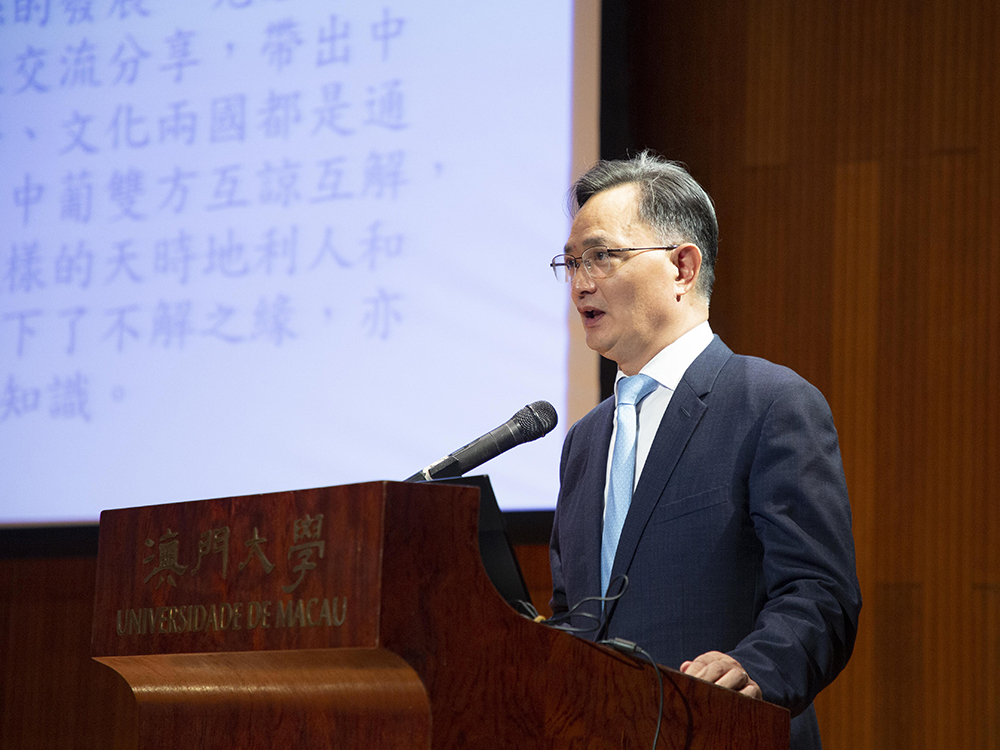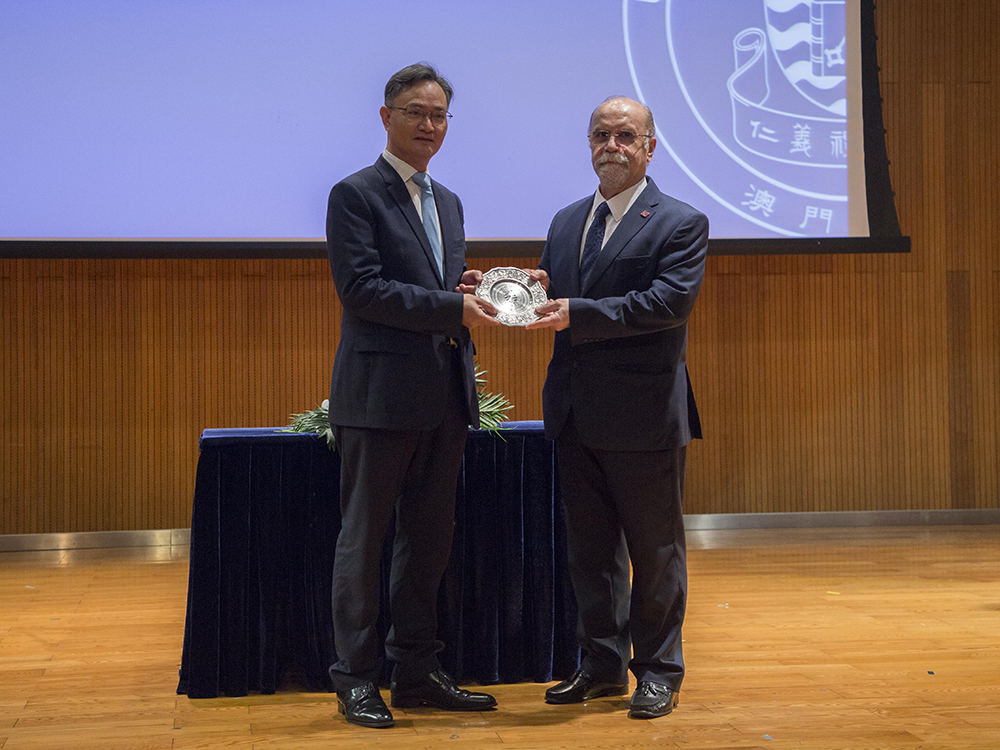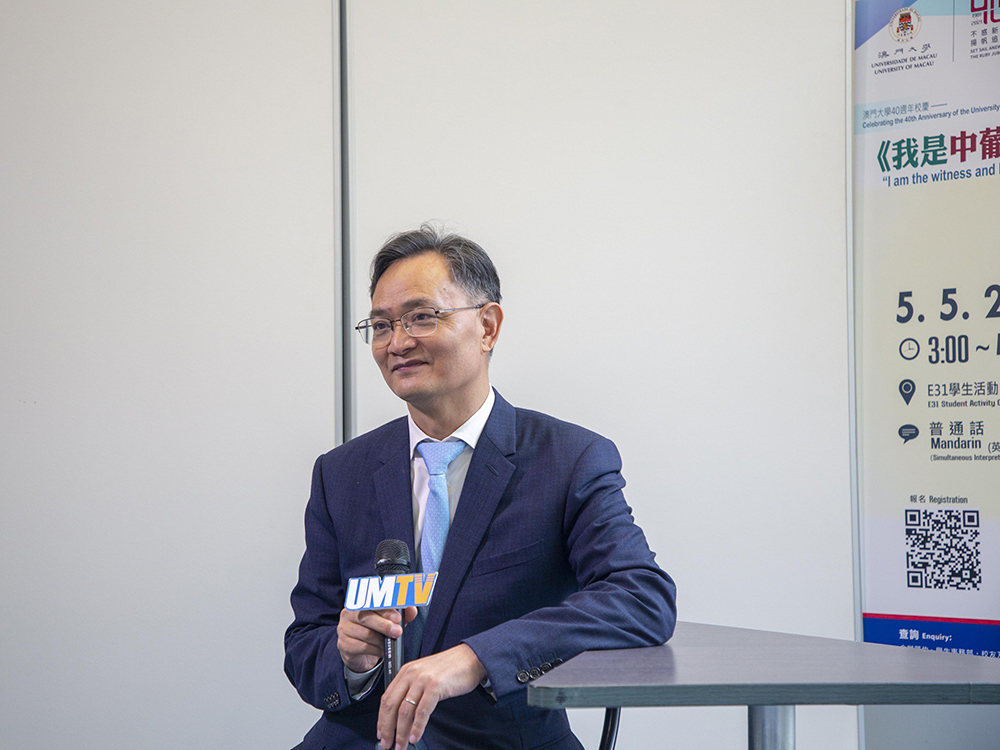Many alumni of the University of Macau (UM) participated in trade between China and Portuguese-speaking countries. Among the pioneers is Mr Timothy Cheong, a veteran businessman and donor to the Cheong Kun Lun College of UM. He shared his stories in business over the decades with students during his lecture titled ‘I Am a Witness to, and a Beneficiary of, Good Sino-Portuguese Relations’, which was co-organised by the Student Affairs Office and the Alumni and Development Office. In his talk, Mr Cheong encouraged students to take advantage of Macao as a platform between China and Portuguese-speaking countries to start their own businesses.
Learning from His First Failure
Mr Cheong started learning the basics of Portuguese in Escola Estrela do Mar, Macao. In 1986, he was admitted to the University of East Asia (UEA), the predecessor of UM, to study his foundation programme. Mr Cheong entered the University College to study business administration in 1987. ‘When I was in UEA, I met several Portuguese-speaking professors. I managed to deepen my understanding of Portuguese language and Portuguese culture through interacting with them’ says Mr Cheong.
Mr Cheong later pursued his further studies in Australia and Portugal before returning to Macao in the early 1990s. ‘At that time, the Chinese and Portuguese governments were actively promoting bilateral trade,’ he recalls. ‘Many Portuguese entrepreneurs were eager to invest in the booming Chinese economy through Macao, so I partnered with a Portuguese businessperson for a plan to build a cement plant in Zhongshan, Guangdong.’ Unfortunately, this first attempt at business soon failed, costing Mr Cheong’s partner USD 1 million and Mr Cheong USD 100,000. He says, ‘It was a devastating experience, but it taught me an important lesson. The biggest reason for failing was that we didn’t pay much attention to the property rights of land plots, which eventually produced legal problems that halted our project. Since then, I have learned to always look into my legal rights carefully before making any investment decisions.’
Bringing Portuguese Investments into Mainland China
In 1993, on the recommendation by the then Chinese ambassador to Portugal, the Portuguese company IPC Holding had the opportunity to invest in a concrete sleeper and high-grade cement production plant in mainland China. Mr Cheong invited IPC Chairman Vasco Pereira Coutinho to the city of Jiangmen in Guangdong province for a site visit and feasibility study, following which they quickly signed a memorandum of understanding. Later, during then Portuguese Prime Minister Cavaco Silva’s visit to China, Mr Cheong and his business partner held a press conference to introduce their project. Without much preparation, Mr Cheong provided simultaneous interpretation for the then Portuguese minister of economy who attended the press conference. That serendipitous experience marked the beginning of his career in coordinating Chinese and Portuguese companies.
In the early stage of preparing for investment, the Portuguese side planned to apply its investment model and experience in Africa to China. At that time, all the partners thought everything was going smoothly, and Mr Cheong also thought that success was in sight, but soon they were dismayed to learn that the project, which involved an investment of USD 200 million, needed permission from the National Planning Commission to go forward. ‘To be honest, Climbing Mount Everest might have been easier,’ says Mr Cheong with a laugh. ‘It was like we thought we had crossed the finish line in a 200-metre dash, only to find ourselves running a marathon.’ From this experience, Cheong learned the differences between Chinese and Portuguese entrepreneurs in their understanding of the investment regime in mainland China.
Instead of feeling depressed, Mr Cheong rose to the challenge. He spent the next four years negotiating with countless government agencies at the central and local levels to push forward the project. ‘I visited all of them in person, ranging from section chiefs at prefecture-level to ministers in the central government,’ he says. ‘Four years later, riding on the good Sino-Portuguese relations on the eve of Macao’s return to China, we finally got the green light from the central government. We also obtained part of the preferential loans Portugal provided to China, and enjoyed the special tax exemption in the mainland. The Bank of China has also actively cooperated and intentionally agreed the using of Portugal’s preferential loan to China for this project, which showed the Chinese government’s goodwill and support to Portuguese companies.’
Encouraging Students to Learn More about Portuguese-speaking Countries
Over the last two decades, Mr Cheong has built a reputation in the construction and hotel industries in Macao. He earned a PhD in international economic law from the University of International Business and Economics in China while holding a full-time job. In 2013, he was awarded the Medal of Industrial and Commercial Merit by the government of the Macao Special Administrative Region. Mr Cheong believes that there are vast opportunities for enhancing trade between China and Portuguese-speaking countries, and young people from both Macao and mainland China have a bigger role to play in the process.
During his talk, Mr Cheong also encouraged UM students to build links with nationals of Portuguese-speaking countries who are residing in Macao, in order to learn more about their countries. ‘Portuguese-speaking countries have a total population of 300 million and a gross domestic product similar to that of the Guangdong-Hong Kong-Macao Greater Bay Area,’ he says. ‘Students can explore the culture of these countries while acquiring knowledge in specialised fields such as accounting and law. By doing that, they can take advantage of Macao’s role as a bridge between China and Portuguese-speaking countries in starting their international businesses.’
Source: My UM e-version




